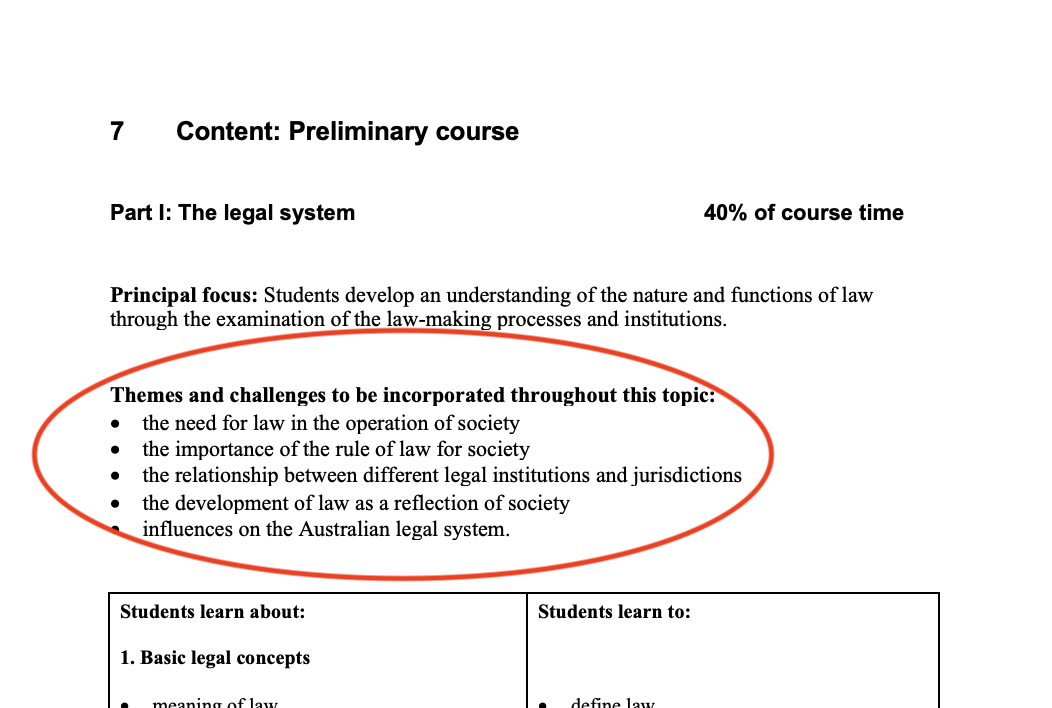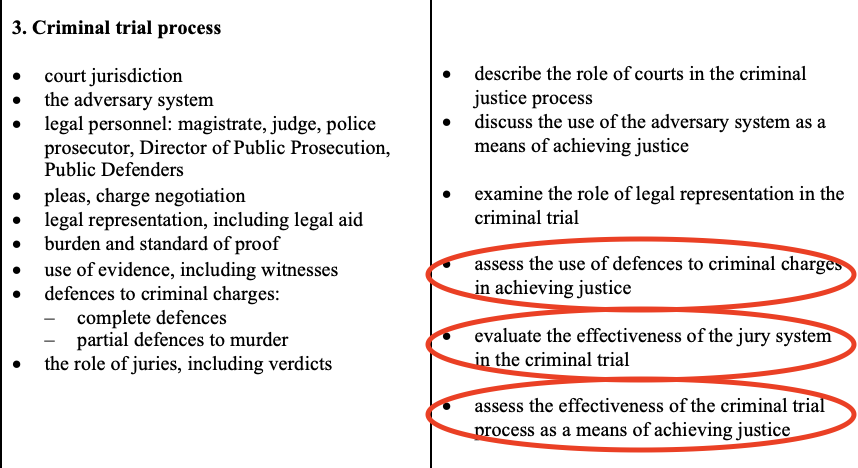How to Write A Legal Studies Essay
Struggling with Legal Studies essay writing?
Whether you’re aiming for a Band 6 or simply want to improve your marks, mastering the art of a clear, concise introduction can make all the difference. The right start sets the tone for your whole essay, and can boost your confidence in the exam room.
This guide will walk you through how to understand and address different question types, how to structuring a strong response (including examples) and how to include LCMID to achieve a Band 6 or A in your next exam.
Ready to get started? Let’s dive in
1) Understanding Question Types
If you can identify the type of question you’re facing, half the battle is already won. The question type determines your thesis, your examples, and even the structure of your body paragraphs. In HSC and Preliminary Legal Studies, essay questions typically fall into three categories:
1. Theme and Challenge Questions
Year 11 The Legal System Themes and Challenges
2022 HSC Crime Questions
These come straight from the ‘Theme and Challenge’ section of your syllabus, which you can find at the top of your legal studies syllabus (just before the ‘learn about’ and ‘learn to columns’)
For example, in The Legal System section of prelims, they might include:
The importance of the rule of law
Influences on the Australian legal system
The development of law as a reflection of society
These are the broadest of the questions as they are about the ‘big picture’ issues that the law aims to address. These are (arguably) the most common, and often the easiest to get right.
You’ll often see command words like assess or evaluate, sometimes with a stimulus or reference to a current legal issue, such as in the 2022 HSC Crime Question.
Strategy: For these questions, think about broad evaluative criteria first (justice, equality, fairness, community safety) and then select specific laws and cases that illustrate your point.
2. Section-Specific or Syllabus Dot-Point Questions
These questions come from the ‘Students Learn To’ column of the syllabus, focusing on specific areas.
Any question that begins with “assess” or “evaluate” from this section of the syllabus can be turned into an entire essay question, so ensure you have at least 3 paragraphs for each.
These are often what students find the most difficult as they are very specific, meaning it’s often difficult to adapt pre-prepared paragraphs from other dot points.
Strategy: Don’t just describe the law—evaluate it. For instance, in a defences question, use a variety of defences of varying effectiveness (eg provocation, consent and mental illness) to show the strengths and weaknesses of the law.
Syllabus questions for Crime
Practice Crime Questions
3. Combined Questions
Sample crime questions
Combined crime Trials question
Most HSC questions combine both a theme and challenge, and a specific syllabus section. Normally, the “easier” theme and challenges are put into these types of essays, and they go in well with the section.
For example, you won’t be asked to write a compliance + criminal trial, essay but you could be asked a compliance + criminal investigation essay, where it wouldn’t be too difficult to generate paragraph ideas – such as police powers (arrest, detention, strip searches).
2) Essay Structure
Introduction
Thesis Statement
The thesis is the first sentence of your essay and should aim to ‘unpack the question’ – ie identifying and expanding on the keywords. Most legal studies essays will start with an ‘assess’ ‘evaluate’ or ‘to what extent,’ which requires you to make a judgement on the effectiveness of the law – whether the law is significantly, moderately or of limited effectiveness in upholding/achieving the theme and challenge.
Most questions will include a theme and challenge, which will require you to specify the relevant rights/parties/ethical and moral standards. If the question uses a broad “achieving justice” as an evaluative criteria, you can select a theme and challenge that aligns with the question (or your favourite/most well known content) and analyse the law through that lens. It’s important to note that the same law may be highly effective at upholding one T&C (such as compliance) but be of limited effectiveness in upholding another (ie, it might abrogate the individual right to privacy and liberty in order to achieve this compliance).
Exemplar Thesis Statement
Another significant element to include in your thesis statement is WHY the law is effective- does it limit discretion, prioritize rights, encourage retribution etc. The why is what turns it from a statement into an argument (which is what markers are looking for!)
2. Topic sentences (x 3)
The next three lines of your introduction should be topic sentences and outline the arguments for each of your body paragraphs. Your topic sentences should be concise, assertive and display your argument. A key mistake is that students try to ‘content dump’ what they know about the topic instead of previewing an argument.
A simple structure to use is
1. Name the specific topic – eg Laws relating to arrests, the Bail Act 2013 (NSW), The Children’s Court, the United Nations Security Council, the ACCC. Try to be specific about the topic- you can include the legislation if you wish.
2. Effectiveness- Is the law relating to this area of high, moderate, or limited effectiveness in upholding your theme and challenge?
3. Theme and Challenge- this should reflect the T&C from the question and your thesis and be more specific. For Example: if the T&C is ‘moral and ethical standards’ you should specify the ‘moral and ethical standard of remedying the overrepresentation of Indigenous Australians in incarceration’
4. Reason why- This is often the most important part- why is the law effective (or ineffective).
3. Linking Sentence
The final sentence is your linking statement. It should restate your thesis, tie back to the question and reiterate the points from your paragraph.
Want the full guide?
Looking for some extra help with your Legal Studies Essays?
We’ve got an incredible team of Legal tutors at Pinnacle!
If you’re looking for personalized guidance or extra support to achieve your academic goals, we’re here for you!
Our one-on-one lessons are available online or in person at our office in Rozelle, giving students across Sydney’s Inner West (Balmain, Leichhardt, Annandale and beyond) the support they need to excel.
Over the years, our students have boosted their results by 20% or more through expert guidance, proven strategies, and depth that goes beyond the textbook.











